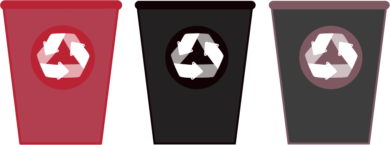The trash cans on the side of my house are filled to capacity right now which means one thing… the holidays are over. What is left is a multitude of large drawstring garbage bags filled with holiday joy sitting out in the cold, waiting to be taken to the curb. But what will happen to this trash once it leaves my driveway?
Where I live, a lot of that depends on the choices my family and I have made when initially depositing the garbage. In our house we have a trash receptacle under the sink for “garbage” and a recycling can by the door going into the garage. The future of our refuse is dependent on us making a conscious effort to sort. Unfortunately, many in the United States don’t make this effort or don’t have recycling capabilities in their area yet. In fact, in the US alone, the amount of recyclable materials discarded in the waste stream would generate over $7 billion if they were recovered. That is an enormous waste of resources!
What Can Be Recycled?
Our community waste hauler has alternating week single stream pickup, and they accept the following materials: plastics 1-7, cardboard, writing paper, magazines, newspaper, junk mail, chipboard, phone books, aluminum, aluminum foil and tin cans, juice boxes, milk cartons, glass (brown, clear, green), and envelopes. All these items can be mixed together in a single container, which we are instructed to place on the left side of our driveway. Once picked up, it is taken to a local sorting center, where the materials are separated and diverted for reuse.
The Plan
So how can we get more of that $7 billion dollars diverted? First, it starts with you. Most areas have a recycling program of some sort, and while not all communities pick up from your residence, many have remote locations where you can drop off recyclables. Some towns also have special days throughout the year for special recycling, such as batteries, paint, and other hazardous household waste. Check with your local government to find out how you can participate.
Talk to your Local Government
If you don’t have any recycling options in your town, take the initiative to ask your local officials why they don’t support recycling. If executed properly, recycling can be an additional revenue generator for a community. Governments also regularly work with independent waste haulers to create recycling programs that benefit both the hauler and the community. Education is key to driving change.
Working Together
Another option is to work together with your neighbors to make recycling runs. Our church regularly collects scrap metal and other recyclables to raise funds for a tuition assistance program. If all else fails, try to reduce the amount of trash you generate. Use cloth towels instead of paper, compost food waste, or bring cloth bags to the grocery store. All these little things help eliminate excessive waste.
This year, as you are cleaning up after all your holiday fun, let’s all work together on reducing that $7 billion dollars. Take the time to think about how you recycle, and what other ways you and your community approach your local waste. A little extra effort now can divert a lot of material later!






